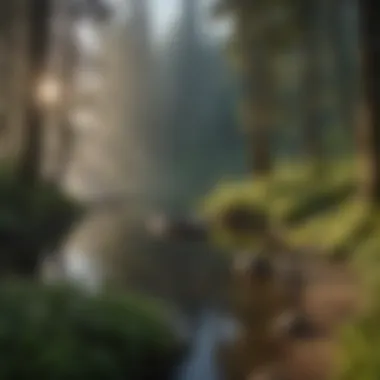Unearthing Unique Campsites in Brookings, Oregon


Intro
Brookings, Oregon, is a hidden gem for outdoor enthusiasts, particularly those seeking unique camping experiences. Nestled along the southern coast of Oregon, this area offers a rich tapestry of natural beauty, historical significance, and ecological diversity. The purpose of this article is to provide a comprehensive guide to the various campsites in Brookings, detailing essential aspects, from the locales' environmental importance to practical considerations for visitors.
Understanding the uniqueness of the region's forest ecology and the practices supporting sustainable forestry is paramount for any camper wishing to experience the serenity and beauty of the Oregon woodlands. This narrative will serve as both an informative resource and an invitation to cherish and protect the natural landscape that Brookings proudly showcases.
Foreword to Brookings, Oregon
Brookings, a coastal city in Oregon, is significant for its diverse natural landscapes and rich ecological systems. This section will emphasize the geographic features and historical context critical to understanding the camping opportunities available in this area. The interplay between nature and history shapes the unique experience for campers in Brookings.
Geographical Overview
Brookings is located on the southern coast of Oregon, adjacent to the Pacific Ocean. This geographical positioning allows for a blend of coastal and forest ecosystems. The city sits within the boundaries of the beautiful Siskiyou National Forest, which contributes to the biodiversity of the region. Key geographical aspects include shoreline cliffs, sandy beaches, and dense forested areas. Compelling natural features such as the Chetco River also flow nearby, offering not just picturesque views but also opportunities for water-based activities.
The microclimate of Brookings is temperate, characterized by mild winters and moderate summers, making it an attractive spot for year-round camping. Seasonal changes create diverse attractions, such as spring wildflowers and autumn foliage, enhancing the camping experience.
Historical Context
The history of Brookings dates back to indigenous populations that thrived off the land and sea long before European settlers arrived. The area's natural resources, including timber and fisheries, attracted settlers in the late 19th century. This history of resource extraction and settlement laid the groundwork for the urban development seen in Brookings today.
Significant developments occurred around the establishment of the lumber industry, which played a pivotal role in the local economy. However, as awareness of environmental issues grew, efforts shifted towards conservation of the natural landscapes that define Brookings. Today, the remnants of its rich history are interwoven with a commitment to preserving these unique ecosystems. Understanding this historical context can deepen appreciation for the camping sites in Brookings, as they are often located in areas that carry historical significance, reflecting the transformation of land use over time.
Ecological Significance of Brookings
The ecological significance of Brookings, Oregon, is deeply intertwined with its rich natural landscape and biodiversity. This coastal city is an area where forests, rivers, and oceans converge, resulting in a unique habitat supporting numerous plant and animal species. Understanding this ecological fabric is crucial for campers, conservationists, and anyone interested in environmental stewardship. The interplay of ecosystems here not only supports wildlife but also contributes to the overall health of the region and the well-being of its human inhabitants.
Biodiversity in the Region
Brookings' diverse ecosystems showcase a remarkable range of biodiversity. The coastal areas include sandy beaches, tidal pools, and estuaries. Inlandly, dense forests consist mainly of Douglas fir, Sitka spruce, and red alder. This variety creates habitats for several species.
- Flora: Over 160 species of native plants flourish here, many of which are endemic to the region.
- Fauna: Wildlife such as black bears, elk, and a rich assemblage of birds, including migratory species, can be observed.
- Aquatic Life: The nearby streams and rivers provide habitats for salmon and other fish species, vital for local ecosystems.
The interrelationship between these species is complex. A balanced ecosystem results in natural pest control, pollination of plants, and nutrient cycling. Preserving biodiversity is essential not only for wildlife but also for humans, as it supports ecosystem services we often take for granted, such as clean water and air.
Impact of Forest Conservation
The forests surrounding Brookings are not only essential for biodiversity but also serve multiple functions that benefit the environment. Forest conservation in this area is crucial for several reasons:
- Carbon Sequestration: Forests absorb carbon dioxide and help mitigate climate change effects, which is becoming increasingly critical.
- Soil Protection: Tree roots stabilize the soil, reducing erosion and maintaining the integrity of nearby waterways.
- Habitat Maintenance: Conserved forest areas provide vital habitats for wildlife, preserving the region's biodiversity.
Efforts such as controlled burns and invasive species management are implemented by local conservation groups. These practices promote forest health and resilience.
"Conservation is a state of harmony between men and land." — Aldo Leopold.
In summary, the ecological significance of Brookings, Oregon, is marked by its rich biodiversity and the beneficial impact of forest conservation. An appreciation of these elements not only enhances the camping experience but also fosters a broader understanding of environmental responsibilities.
Types of Campsites Available
Understanding the types of campsites available in Brookings, Oregon, is crucial for anyone planning a camping trip. This section explores the various options and their unique characteristics. Knowing the differences can enhance the overall camping experience and ensure that visitors make informed choices based on their preferences and needs.
Public Campsites
Public campsites in Brookings are often managed by state or local authorities. They tend to provide basic facilities like restrooms and picnic areas. Harris Beach State Park is a prime example, offering direct access to the beach and stunning ocean views. These sites are generally more affordable than private options, making them accessible for large groups and families. However, they may also attract larger crowds, especially during peak seasons. Advance reservations are typically recommended as popular areas can quickly fill up during weekends and holidays.


Benefits of public campsites include:
- Cost-effective options for families and groups.
- Opportunities to interact with other campers and share experiences.
- Proximity to natural wonders and recreational activities.
Private Campgrounds
Private campgrounds offer a different experience. They are often more developed and may include amenities such as swimming pools, Wi-Fi, and organized activities. An example is Sandy Beach Campground, which provides a family-friendly atmosphere and well-maintained facilities. While generally more expensive than public campsites, the investment can lead to enhanced convenience and comfort.
Visitors should consider the following when choosing a private campground:
- Availability of additional services such as firewood sales and convenience stores.
- Enhanced privacy due to fewer campsites compared to public areas.
- Possibility of booking sites with unique features, such as waterfront locations.
Backcountry Sites
For those seeking solitude and a deeper connection with nature, backcountry sites are ideal. These sites are often located in more remote areas and require a bit of a journey to reach. Whaleshead Beach Campground offers a unique backcountry experience, with stunning views and less foot traffic. However, campers should be prepared for minimal facilities and self-sufficiency when it comes to food and supplies.
Key considerations for backcountry camping include:
- Understanding the terrain and navigation skills required.
- Carrying all necessary gear for your trip, as amenities will be limited.
- Ensuring compliance with any regulations set for remote camping.
Backcountry sites offer unique opportunities for exploration and solitude, but also demand careful planning and preparedness.
Each type of campsite has its own strengths and advantages. Choosing the right one will significantly affect the camping experience in Brookings. Whether it is the community feel of public sites, the comfort of private campgrounds, or the adventure of backcountry locations, each option contributes to the rich tapestry of camping experiences in this unique region.
Detailed Review of Notable Campsites
This section focuses on specific campsites in Brookings, Oregon, providing a thorough review of each one. Notable campsites are essential to understand because they not only showcase the best that Brookings has to offer but also help visitors make informed choices. Their unique characteristics, amenities, and overall atmosphere present camping experiences tailored to a variety of preferences. Evaluating these campsites aids in appreciating both the recreational value and the ecological importance of the region.
Harris Beach State Park
Harris Beach State Park is one of the most renowned camping spots in Brookings. Its proximity to the coastline and stunning ocean views create a picturesque environment. The park features various campsites, all equipped with essential amenities, making it suitable for both families and solo travelers.
Camping here allows guests easy access to a multitude of recreational activities. From hiking trails that meander through lush landscapes to tide pool investigations along the beach, there is much to explore. The park also serves as a significant habitat for local wildlife, including sea otters and various seabird species. This presents great opportunities for wildlife observation, which can enrich the camping experience.
"Harris Beach State Park is not just a place to camp. It’s a gateway into the rich maritime ecosystem of the Oregon coast."
For those interested in beachcombing, the area features some of the most beautiful and accessible sandy stretches. Amenities like picnic areas and restrooms enhance ease and comfort during stays. Thus, Harris Beach State Park stands out as an option that balances natural beauty with functional camping facilities.
Sandy Beach Campground
Sandy Beach Campground appeals to those seeking a more tranquil camping atmosphere. Located further from the hustle of the town, this campground offers sites nestled amidst tall trees and is a short walk from the beach.
This campground is popular for its privacy and natural setting. Each campsite is spread out, allowing campers a sense of seclusion which many find appealing. Sandy Beach is also known for its beautiful sunsets, making it perfect for evening gatherings around the campfire. The community feeling among campers adds to the overall charm, as many return here year after year.
The amenities are basic but sufficient. There are toilets and water access, but it is advisable to come prepared with your own supplies for a more comfortable stay. Its simplicity fosters a deeper connection to nature, which complements its appealing atmosphere.
Whaleshead Beach Campground
Whaleshead Beach Campground is perhaps one of the most scenic sites in the area. Its siting directly on the beach offers breathtaking views of the Pacific Ocean, framed by dramatic cliffs. This campground is particularly suited for those who appreciate coastal beauty and explore its surroundings.
Adventurous campers are drawn here for the myriad of activities available. Here, you can engage in surf fishing, clamming, or simply enjoying the sound of the waves crashing on the shore. The proximity to nearby trails leads to scenic hikes with panoramic views of the coastline.
Whaleshead offers a range of amenities, including fire pits and picnic tables. This makes meals and relaxation more convenient for families and groups. The combination of beautiful ocean vistas, outdoor activities, and family-friendly facilities make Whaleshead Beach Campground a notable choice among campsites in Brookings.


Overall, these campsites exemplify the diverse options available to campers seeking to enjoy the unique ecological and cultural aspects of Brookings, Oregon.
Amenities and Facilities
Understanding the amenities and facilities available at campsites is crucial for any outdoor enthusiast. Ensuring comfort and convenience during a camping experience enhances the overall enjoyment. In Brookings, Oregon, campsites vary in the type and level of services provided. This section will cover essential camping amenities, recreational facilities, and accessibility features, aiming to inform and assist potential visitors in making well-informed decisions.
Basic Camping Amenities
Basic camping amenities serve as the foundation for a positive camping experience. These include essential services like:
- Restrooms and Showers: Clean facilities are critical for health and hygiene. The presence of well-maintained restrooms and showers can significantly improve comfort levels.
- Water Supply: Access to potable water is paramount. Many campsites in Brookings provide water stations.
- Dump Stations: For visitors using RVs, having a proper waste disposal option is necessary.
- Fire Pits and Grills: Cooking equipment enhances meal preparation options, while fire pits provide warmth and ambiance.
These amenities are not merely conveniences; they contribute to a safer and more enjoyable camping experience.
Recreational Facilities
The diverse recreational facilities available at Brookings campsites enrich the camping experience. Engaging in various activities can enhance visitor satisfaction. Most parks in the area include:
- Trails for Hiking and Biking: Well-marked paths allow campers to explore the stunning surroundings. Trails vary in difficulty and length, catering to different skill levels.
- Picnic Areas: These spaces are ideal for communal meals and relaxation, featuring tables and shelters.
- Water Activities: Proximity to beaches and coastal areas allows for swimming, fishing, and kayaking.
- Playgrounds: Many family-friendly campgrounds have designated areas for children to play, ensuring fun for younger visitors.
Overall, the availability of recreational facilities provides opportunities for both relaxation and adventure.
Accessibility Features
In today's camping landscape, inclusivity is essential. Accessibility features ensure everyone can enjoy the beauty of Brookings' natural spaces. Considerations include:
- Wheelchair-Accessible Sites: Many campgrounds are designed with flat, easily navigable spaces for campers with mobility challenges.
- Accessible Restrooms: These facilities ensure that all visitors have access to essential services without barriers.
- Parking Options: Campsites often provide designated parking spaces near accessible sites, reducing travel distance for individuals with disabilities.
By focusing on accessible designs, Brookings camping facilities promote equality, enabling diverse visitor groups to participate in outdoor recreation.
Camping Regulations and Guidelines
Camping regulations and guidelines serve an essential function in maintaining the ecological integrity of camping sites, particularly in areas rich in biodiversity like Brookings, Oregon. Understanding these regulations not only helps ensure a safe camping experience but also promotes responsible behavior among visitors. Knowledge of permits, reservations, and environmentally-focused practices contributes to preserving the natural resources that draw people to these campsites.
Permits and Reservations
Permits and reservations are often required for various campsites within Brookings. These protocols help manage the number of visitors and minimize human impact on the environment. Moreover, many sites, particularly those that are popular or located in protected areas, necessitate a reservation due to limited space.
Park systems like the Oregon State Parks require visitors to book their spots ahead of time. This can be done online or through direct contact with the campground authorities. Keeping track of seasonal availability is crucial, especially during peak times when demand surges.
In addition, certain activities may require specific permits, such as fishing or firewood collection. Failing to adhere to these regulations may result in fines or removal from the site.
It is beneficial for campers to familiarize themselves with these requirements prior to their visit. By doing so, they ensure a smoother experience, while also supporting conservation efforts aimed at protecting the unique environment of Brookings.
Environmental Guidelines
Environmental guidelines are critical in preserving the delicate ecosystems found in and around Brookings. These guidelines advocate for practices that reduce environmental impacts and promote sustainability. By following such guidelines, campers can contribute to the conservation of the area's distinctive flora and fauna.
Some key environmental guidelines include:
- Leave No Trace Principles: This set of principles encourages visitors to minimize their ecological footprint, which includes packing out all trash, staying on designated trails, and not disturbing wildlife.
- Proper Waste Disposal: Campers should dispose of organic waste in composting designated areas, while non-organics must be packed out.
- Fire Safety Regulations: Campfires are often the source of both warmth and cooking. However, adhering to fire safety guidelines is crucial. Campers should only use established fire pits and ensure that fires are completely extinguished before leaving the campsite.
- Water Conservation: With water being a precious resource, it is important to be mindful of its use, especially in more arid areas.
"Respecting the environment is not just a guideline; it’s an essential part of camping culture and responsibility."


In summary, understanding and following camping regulations and guidelines in Brookings aligns visitors with the broader goals of environmental conservation. This knowledge enhances the overall camping experience while supporting the preservation of the area's natural beauty for future generations.
Sustainable Camping Practices
Sustainable camping practices are essential for preserving the natural beauty and ecological balance of areas like Brookings, Oregon. They ensure that the campgrounds and surrounding environments can endure the impact of human activity while promoting a culture of conservation. These practices play a role in maintaining biodiversity and protecting habitats for wildlife. They also set a standard for responsible outdoor recreation, emphasizing the importance of minimizing footprint while enjoying nature.
Leave No Trace Principles
The Leave No Trace principles serve as a fundamental framework for sustainable camping. These principles guide campers in their actions to help protect the environment and maintain the integrity of natural spaces. Key elements include:
- Plan Ahead and Prepare: Understanding the specific area you will be camping in is crucial. Research weather conditions, terrain, and park regulations before departure. This preparation helps minimize risks and improves your overall experience.
- Travel and Camp on Durable Surfaces: Stick to established trails and campsites. This reduces the chance of soil erosion and protects delicate ecosystems. Avoid creating new paths or setting up camp in vulnerable areas, such as meadows or near water bodies.
- Dispose of Waste Properly: Pack out all trash, leftover food, and personal waste. Bury human waste at least six inches deep and away from water sources, or use restroom facilities when available. This prevents pollution and maintains hygiene in camping areas.
- Leave What You Find: Preserve the environment by not removing rocks, plants, or historical artifacts. Take only pictures and leave only footprints to ensure that others can enjoy the same natural beauty.
Adhering to these principles protects the environment for future generations. It fosters a culture of respect for nature, helping to educate fellow campers on their importance. Consider the broader impact of your individual choices on communal outdoor spaces.
Wildlife Conservation Tips
Wildlife conservation is a vital aspect of sustainable camping. Campers should aim to minimize their effects on local fauna. Implementing specific actions can help foster a healthy wildlife population:
- Understand Local Wildlife: Familiarize yourself with the wildlife in Brookings. This knowledge allows you to appreciate their habitats and behaviors, and to recognize and avoid areas crucial for their survival.
- Store Food Properly: To avoid attracting wildlife, securely store food in bear-resistant containers or keep it in your vehicle. Never leave food unattended at your campsite. Educate yourself on local regulations for food storage and adhere strictly to them.
- Observe Wildlife from a Distance: Always maintain a safe distance from animals. Do not approach or feed them, as this behavior can lead to dangerous situations for both campers and wildlife. Use binoculars or a camera with a zoom lens to safely observe their natural behavior.
- Report Sightings: If you encounter wildlife in distress or unsafe situations, report them to local park authorities. This helps maintain the safety and health of both wildlife and campers.
By integrating these wildlife conservation tips into your camping practices, you contribute positively to the ecological balance of the region. Supporting responsible wildlife interactions fosters a rich and engaging camping experience.
By practicing sustainable camping, individuals can protect the beauty of Brookings and ensure future generations have the same opportunities to enjoy the great outdoors.
Community Engagement and Activities
Community engagement plays a crucial role in fostering a sustainable camping culture in Brookings, Oregon. It creates bonds between the campers and the local environment, as well as between visitors and residents. Involvement in local initiatives ensures that the area remains pristine and vibrant. When campers take part in community activities, they gain a deeper understanding of the ecological and cultural context of the region. This, in turn, encourages more responsible practices while enjoying the natural surroundings.
Local Conservation Efforts
In the Brookings area, several local conservation efforts are in place to protect its unique ecosystems. Organizations collaborate with the community to promote sustainable practices and awareness about the importance of biodiversity. Notable efforts include cleanup drives in the surrounding forests and beaches, tree-planting initiatives, and educational programs focused on wildlife conservation.
Residents and campers can participate in these projects to not only help preserve the landscape but also to educate themselves about the various species that inhabit the region. Engaging in local conservation efforts strengthens community ties while fostering a sense of shared responsibility over natural resources.
"Preserving our natural heritage is a responsibility that belongs to everyone. Participating in local conservation efforts is one way to honor this commitment."
Volunteer Opportunities
Volunteering presents numerous opportunities for individuals keen on making an impact. Many nonprofits and community groups welcome assistance with projects, ranging from habitat restoration to educational outreach programs. Volunteer days often focus on hands-on activities, which include trail maintenance, invasive species removal, and wildlife surveys. \n For those camping in Brookings, setting aside time for volunteering can enrich their experience and connection to the land. Not only do volunteers contribute positively to the environment, but they also develop friendships with fellow outdoor enthusiasts and gain valuable skills.
By understanding the local flora and fauna, volunteers become well-informed advocates for responsible camping practices. Thus, participation in community activities and volunteering is vital for ensuring the ecological integrity of Brookings and is a rewarding experience for all involved.
Finale
The significance of concluding this article lies in encapsulating the numerous insights regarding camping in Brookings, Oregon. A well-rounded conclusion not only summarizes the benefits of various camping options available but also emphasizes the need for responsible practices to protect the pristine environment.
Recap of Camping Benefits in Brookings
Brookings offers an array of camping experiences tailored to diverse preferences. Whether one prefers the structured environment of a public campsite or the secluded nature of backcountry sites, there is something to suit every camper's needs. Key benefits include:
- Biodiversity: Campers engage with unique ecosystems, fostering a deeper appreciation for nature.
- Accessibility: Many campsites offer facilities catering to all, enhancing the camping experience for everyone.
- Community Engagement: Opportunities to connect with local conservation efforts are prevalent, enriching not just the individual experience, but also supporting regional ecology.
This variety enhances recreational opportunities, making camping in Brookings not just a pastime but a means of contributing to ecological conservation and community vitality.
Encouragement Towards Responsible Camping
As the popularity of camping continues to rise, it is vital for campers to adopt responsible practices to protect the natural environment. Some key recommendations include:
- Understanding Local Regulations: Knowledge about permits and rules ensures that campers can enjoy nature while minimizing their impact.
- Following Leave No Trace Principles: By carrying out all trash and minimizing fire impact, campers preserve the beauty of the area for future generations.
- Participating in Conservation Activities: Engaging in local conservation efforts fosters a stronger bond with the environment and contributes positively to the local community.
"Responsible camping is not merely a suggestion; it is a necessity to sustain the incredible landscapes we enjoy."















